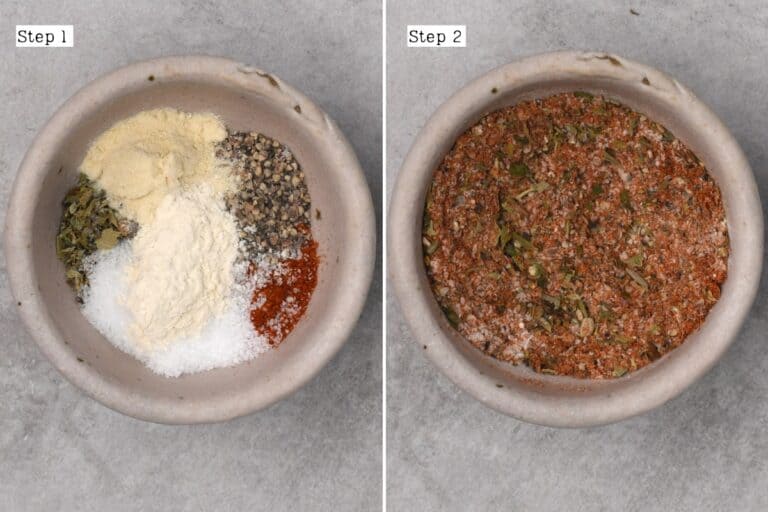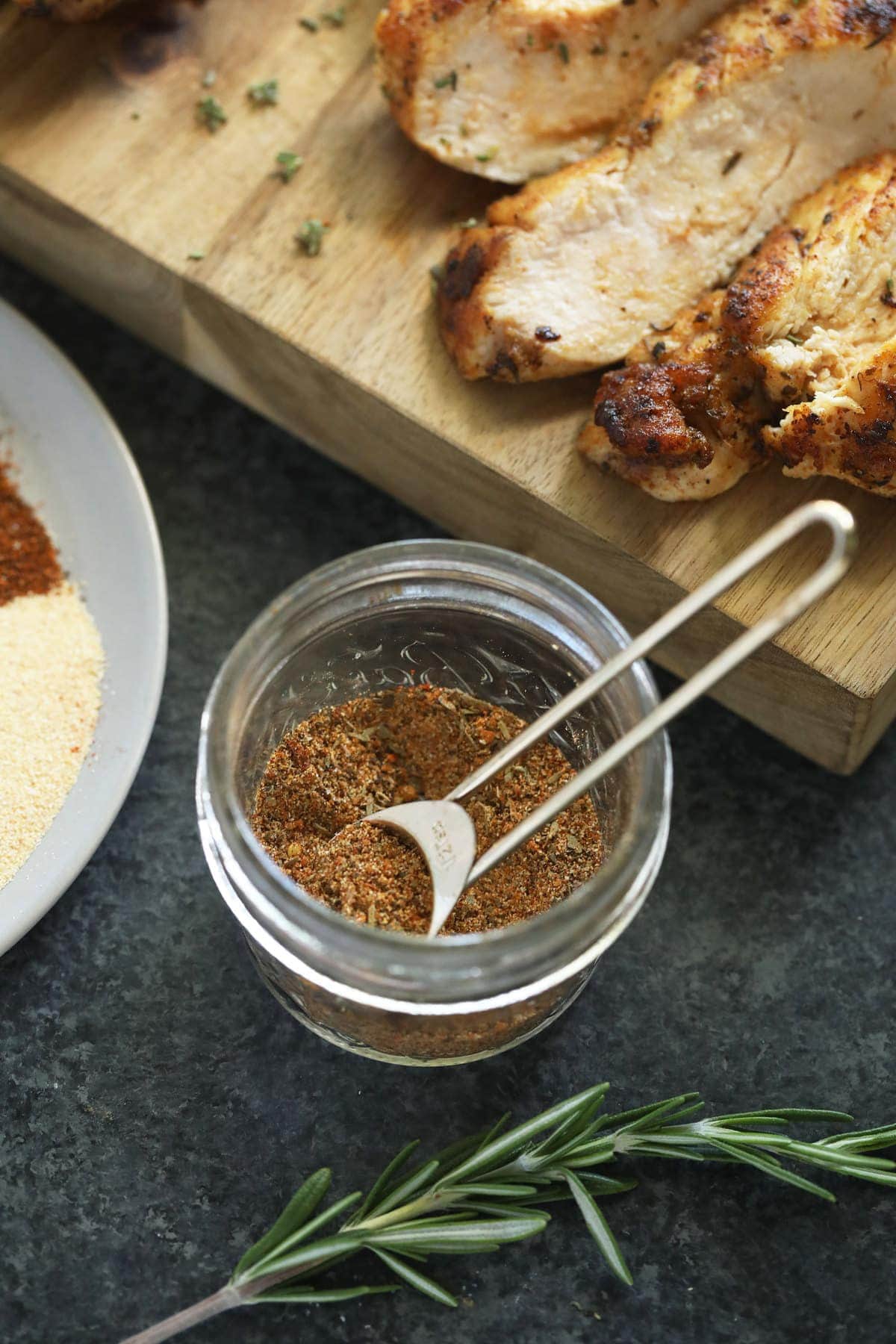Ever stared at your chicken wondering if you’re adding too much or too little seasoning? Trust me, I’ve been there! Getting the seasoning just right can make the difference between “meh” chicken and mouth-watering, flavor-packed chicken that your family will rave about.
As someone who cooks chicken at least 3 times a week (yes, I’m slightly obsessed), I’ve figured out the perfect ratios for seasoning chicken. Today, I’m sharing all my secrets so you can achieve perfectly seasoned chicken every single time!
The Magic Formula: How Much Seasoning Per Pound?
Let’s cut to the chase – here’s what you need to know about seasoning amounts
- The general rule: 1 tablespoon of seasoning per pound of chicken
- For salt specifically: 1 teaspoon of salt per pound of chicken meat
- For a whole chicken: 1 rounded tablespoon of salt
But wait! These are just starting points. The actual amount can vary based on several factors that we’ll dive into below
Why Proper Seasoning Matters
Before we go further, let’s talk about why getting the seasoning right is so important. Proper seasoning:
- Enhances the natural flavor of chicken
- Creates juicier meat (especially when using salt)
- Helps create that delicious crispy exterior we all love
- Transforms bland chicken into something memorable
As my grandma always said, “Chicken is just a canvas – the seasoning is what makes it art!” (Okay, she never actually said that, but it sounds good, right?)
Factors That Affect How Much Seasoning You Need
Not all chicken is created equal! Several factors influence how much seasoning you’ll need:
1. Cut and Texture
Different cuts of chicken require different amounts of seasoning:
- Chicken breasts: Being leaner, they need more seasoning – about 1 teaspoon per breast or 1-2 teaspoons per pound
- Bone-in thighs/legs: 3/4 to 1 teaspoon per piece or 1 to 1 1/2 teaspoons per pound
- Boneless thighs/legs: 1/2 to 3/4 teaspoon per piece or 1 to 1 1/2 teaspoons per pound
- Whole chicken (3-4 lbs): 1-2 tablespoons total
Dark meat is naturally more flavorful than white meat, so it needs less seasoning to shine.
2. Skin-On vs. Skinless
This makes a HUGE difference:
- Skin-on chicken: The skin adds flavor, so you’ll need less seasoning
- Skinless chicken: More seasoning is needed to compensate for the flavor loss
Pro tip: When cooking skin-on chicken, season UNDER the skin as well as on top for maximum flavor!
3. Cooking Method
Your cooking technique affects seasoning too:
- Grilled chicken: Use about 1.5 times more seasoning since some falls through the grates
- Baked chicken: Be generous with seasoning
- Fried chicken: Season the flour mixture rather than the raw chicken
- Slow-cooked chicken: Use less salt initially as flavors concentrate during cooking
Best Seasonings for Chicken
While the amount of seasoning is important, so is the type! Here are some winning combinations for chicken:
All-Purpose Chicken Seasoning
This 5-star seasoning blend is my go-to for any chicken dish:
- 1 teaspoon garlic powder
- 1/2 teaspoon chili powder
- 1/2 teaspoon cumin
- 1/2 teaspoon dried thyme
- 1/2 teaspoon ground mustard
- 1/2 teaspoon dried basil
- 1/4 teaspoon ground pepper
- 1/4 teaspoon red pepper flakes
- 1/4 teaspoon sea salt
- 1/4 teaspoon paprika
- 1/2 teaspoon brown sugar
This makes enough for about 1 pound of chicken. It’s sweet from the brown sugar, savory from the garlic and spices, and has a touch of smokiness from the paprika.
Other Great Seasoning Options
Depending on what you’re going for, try these seasoning amounts per pound of chicken:
- Poultry Seasoning: 1 tablespoon per pound
- Taco Seasoning: 1 to 2 tablespoons per pound
- Italian Seasoning: 1 to 2 teaspoons per pound
- Creole Seasoning: 1 to 2 teaspoons per pound
- Blackened Seasoning: 1.5 teaspoons per pound
Remember, even if your seasoning blend includes salt, you might need to add a bit more (about 1/2 teaspoon per pound) for optimal flavor.
The Right Way to Season Chicken
Just throwing seasoning at your chicken isn’t enough! Here’s my foolproof method:
- Pat the chicken dry with paper towels (this is SUPER important for the seasoning to stick)
- Season generously on all sides
- Gently rub the seasonings into the meat
- Let it sit for about 15 minutes before cooking (this allows the flavors to penetrate)
For skin-on chicken, make sure to season both under and over the skin. Lift the skin gently without detaching it completely and rub seasoning directly onto the meat.
Special Tips for Different Chicken Cuts
Whole Chicken
When seasoning a whole bird:
- Season the cavity and stuff with aromatics like lemon, garlic, and herbs
- Loosen the skin and season directly on the meat
- Be extra generous with the breast meat (it needs more help!)
- Consider brining for extra juiciness
Chicken Breasts
Chicken breasts can be tricky because they’re so lean:
- Pound to even thickness for more uniform cooking
- Use salt generously – breasts need extra seasoning
- Consider butterflying to reduce cooking time and allow more even seasoning
Chicken Thighs
Thighs are more forgiving:
- Skin-on thighs need less seasoning than skinless
- Salt well for moisture retention
- Marinating overnight works great for thighs
Common Mistakes to Avoid
We all make mistakes, but let’s try to avoid these seasoning blunders:
- Under-seasoning – Nothing is worse than bland chicken!
- Not drying the chicken before seasoning – Your spices will slide right off
- Seasoning unevenly – Make sure to get all sides
- Forgetting to season under the skin – So much flavor potential lost!
- Adding all your seasoning to the pan instead of the chicken – Rookie mistake!
FAQ: Your Chicken Seasoning Questions Answered
How do you season a pound of chicken?
Pat the chicken dry, rub with a little oil if desired, and use about 1 tablespoon of seasoning mix per pound, making sure to cover all surfaces.
Do I need to oil the chicken before seasoning?
A light coating of oil can help seasonings stick better, but it’s not always necessary. Pat-dried chicken will still hold seasonings well.
Can I season chicken ahead of time?
Absolutely! Seasoning chicken up to 24 hours in advance and refrigerating it can enhance flavor. Just make sure it’s loosely wrapped.
How much salt is too much?
While 1 teaspoon per pound is the general guideline, trust your taste buds. If you’re sensitive to salt, start with half that amount.
Let’s Get Seasoning!
Properly seasoning chicken isn’t rocket science, but it does make a world of difference in your cooking! Start with the basic guideline of 1 tablespoon of seasoning mix per pound of chicken, and adjust based on the cut, cooking method, and your personal taste.
Remember, cooking is all about experimenting and finding what works for YOU. So grab those spices, season with confidence, and enjoy some seriously delicious chicken!
Have you found the perfect chicken seasoning combination? I’d love to hear about it in the comments below!
P.S. Don’t forget to store any homemade seasoning blends in an airtight container in a cool, dark place. They’ll stay fresh for up to 12 months!

What spices are in this chicken seasoning?
Instead of buy a pre-made chicken seasoning at the store, dig into your pantry for these spices:
- Garlic powder
- Chili powder
- Cumin
- Dried thyme
- Ground mustard
- Dried basil
- Ground pepper
- Red pepper flakes
- Sea salt
- Paprika
- Brown sugar
Now it’s time to season your chicken!
Wondering how to season chicken? It’s so easy. My #1 tip is to make sure not to under-season your chicken. Nothing is worse than flavorless chicken. Plus, this seasoning isn’t overly salty, so you really can’t over-season.
- Pat your chicken dry with a paper towel.
- Then, sprinkle seasoning on all sides of your chicken and lightly rub it into the meat.
- Let sit for around 15 minutes for optimal flavor.

